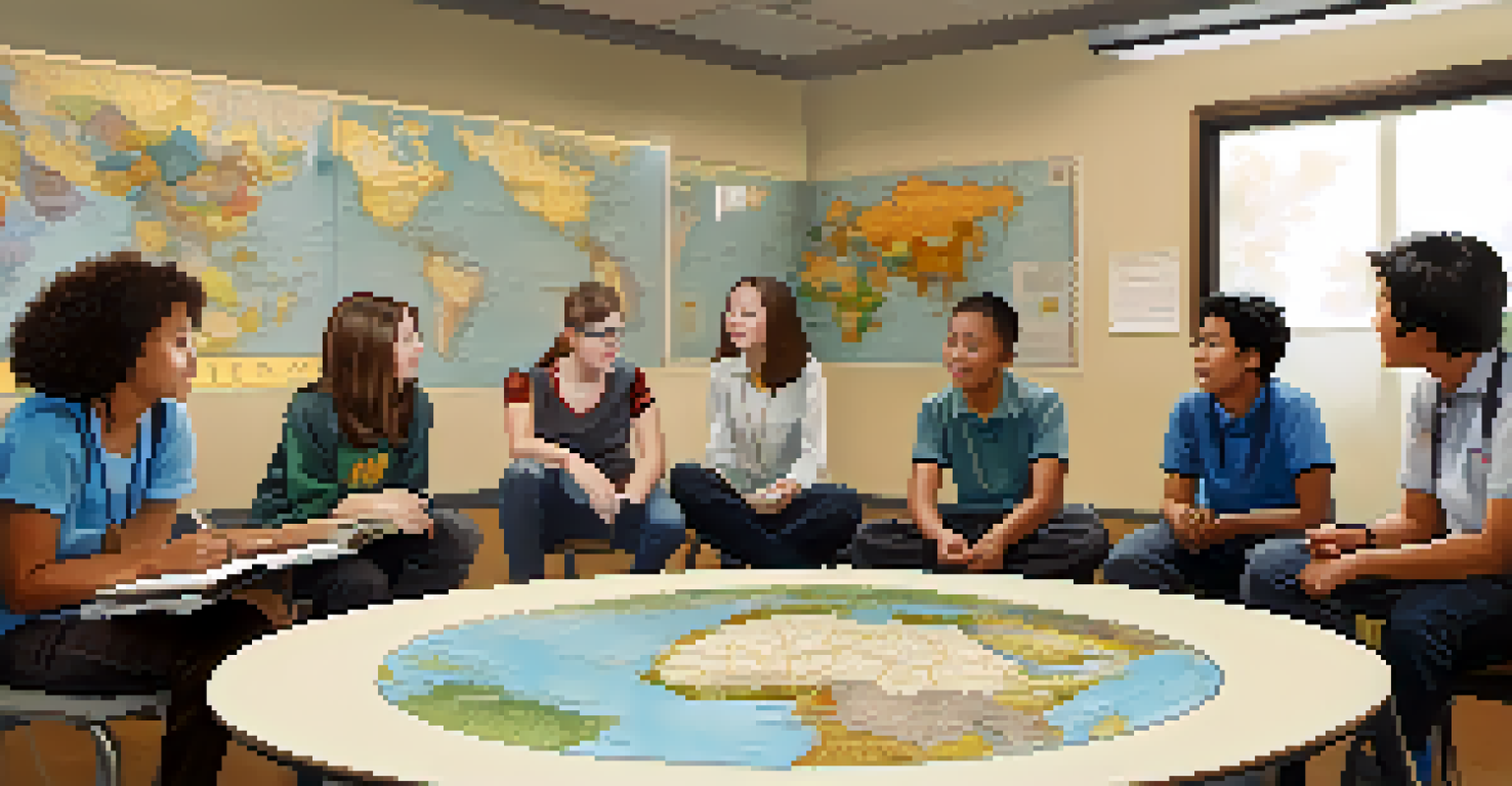The Impact of Cultural Competence on Community Learning

Understanding Cultural Competence in Community Learning
Cultural competence refers to the ability to understand, communicate with, and effectively interact with people across cultures. It plays a crucial role in community learning, where diverse groups come together to share knowledge and experiences. By fostering an environment of respect and understanding, cultural competence sets the stage for meaningful interactions.
Diversity is not about how we differ. Diversity is about embracing one another's uniqueness.
When community members are culturally competent, they are better equipped to engage with others from different backgrounds. This engagement leads to a richer exchange of ideas and perspectives, essential for collaborative learning. Think of it as a potluck dinner, where everyone brings unique dishes—each contribution enriches the overall experience.
Ultimately, cultural competence is about more than just awareness; it’s about actively valuing diversity. As communities become more interconnected, the need for cultural competence in learning settings becomes increasingly vital to create inclusive spaces for everyone.
Benefits of Cultural Competence in Learning Environments
One of the most significant benefits of cultural competence is improved communication. When individuals understand cultural nuances, it minimizes misunderstandings and fosters a more open dialogue. This open communication is essential in learning environments, where sharing ideas freely can lead to innovation and growth.

Moreover, culturally competent learning environments tend to be more inclusive. They encourage participation from diverse groups, allowing for a variety of viewpoints to be heard. Imagine a classroom where every student feels safe to express their thoughts—this kind of environment enhances the overall quality of education.
Cultural Competence Enhances Learning
By fostering understanding and respect, cultural competence enriches community learning experiences.
In addition to enhancing participation, cultural competence can lead to better problem-solving. Different cultural backgrounds bring diverse ways of thinking, which can help communities tackle challenges creatively. This collaborative approach not only enriches the learning experience but also builds stronger community bonds.
Cultural Competence and Inclusivity in Education
Inclusivity is a cornerstone of effective education, and cultural competence is its foundation. When educators embrace cultural differences, they create a learning environment where all students feel valued and respected. This sense of belonging is crucial for students to thrive academically and socially.
Cultural competence is the ability to effectively navigate and engage with diverse cultures, making it essential for successful communication and collaboration.
Culturally competent educators are more likely to adapt their teaching strategies to meet the diverse needs of their students. For instance, using examples from various cultures can make learning more relatable and engaging. This adaptability not only enhances comprehension but also fosters a love for learning.
Furthermore, promoting cultural competence in education can help dismantle stereotypes and biases. When students learn about each other's cultures, they develop empathy and understanding, which are essential qualities for building harmonious communities. This transformative process encourages respect for differences, cultivating a more inclusive society.
The Role of Cultural Competence in Community Development
Cultural competence plays a significant role in community development by fostering collaboration among diverse groups. When community leaders prioritize cultural understanding, they can bring people together to address shared goals. This collaboration can lead to more effective initiatives that reflect the needs and values of all community members.
Additionally, culturally competent communities are better equipped to navigate challenges. They leverage the strengths of their diverse populations, turning potential conflicts into opportunities for growth. Picture a neighborhood coming together to solve a local issue—with varied perspectives, the solutions can be more comprehensive and effective.
Inclusivity Drives Educational Success
Culturally competent educators create inclusive environments that allow all students to thrive academically and socially.
Moreover, community development initiatives that embrace cultural competence tend to be more sustainable. By involving all stakeholders in the decision-making process, these initiatives are more likely to gain support and commitment from the community. This ensures that the benefits of development are felt by everyone, fostering a sense of ownership and pride.
Challenges to Achieving Cultural Competence
Despite its importance, achieving cultural competence can be challenging. One major hurdle is the presence of unconscious biases, which can influence perceptions and interactions. These biases often stem from stereotypes and can create barriers to effective communication and collaboration.
Additionally, a lack of resources or training can hinder efforts to foster cultural competence. Many organizations may not prioritize professional development in this area, leaving individuals ill-equipped to engage with diverse populations. This gap can perpetuate misunderstandings and limit opportunities for learning.
Furthermore, resistance to change can pose a significant challenge. Some individuals may feel threatened by the idea of acknowledging cultural differences, leading to discomfort in discussing these topics. Overcoming this resistance requires patience, open dialogue, and a commitment to continuous learning.
Strategies for Enhancing Cultural Competence
Enhancing cultural competence begins with education and awareness. Workshops, training sessions, and discussions can help individuals recognize their biases and learn about different cultures. These educational opportunities serve as a catalyst for fostering understanding and empathy within communities.
Another effective strategy is to engage in community-building activities that promote cultural exchange. Events such as cultural festivals or discussion forums allow individuals to experience and celebrate each other’s backgrounds. These interactions not only enrich personal experiences but also strengthen community ties.
Community Development Requires Collaboration
Cultural competence fosters collaboration among diverse groups, leading to more effective and sustainable community initiatives.
Lastly, seeking feedback from diverse community members can provide valuable insights into areas needing improvement. By actively listening to different perspectives, communities can adapt their approaches and create more inclusive environments. This continuous loop of feedback fosters a culture of learning and growth.
The Future of Cultural Competence in Community Learning
Looking ahead, the importance of cultural competence in community learning will only grow. As our world becomes more interconnected, the ability to navigate cultural differences will be essential for success. Communities that prioritize cultural competence will be better prepared to face the challenges of an increasingly diverse society.
Emerging technologies and digital platforms also present new opportunities for cultural learning. Online courses, webinars, and virtual exchanges can facilitate cross-cultural interactions that enrich community learning. These tools can break down geographical barriers, allowing for a more inclusive exchange of ideas.

Ultimately, the future of cultural competence lies in a collective commitment to understanding and valuing diversity. By fostering a culture of inclusivity and respect, communities can create vibrant learning environments that celebrate differences and drive innovation. The journey toward cultural competence is ongoing, but the rewards are well worth the effort.